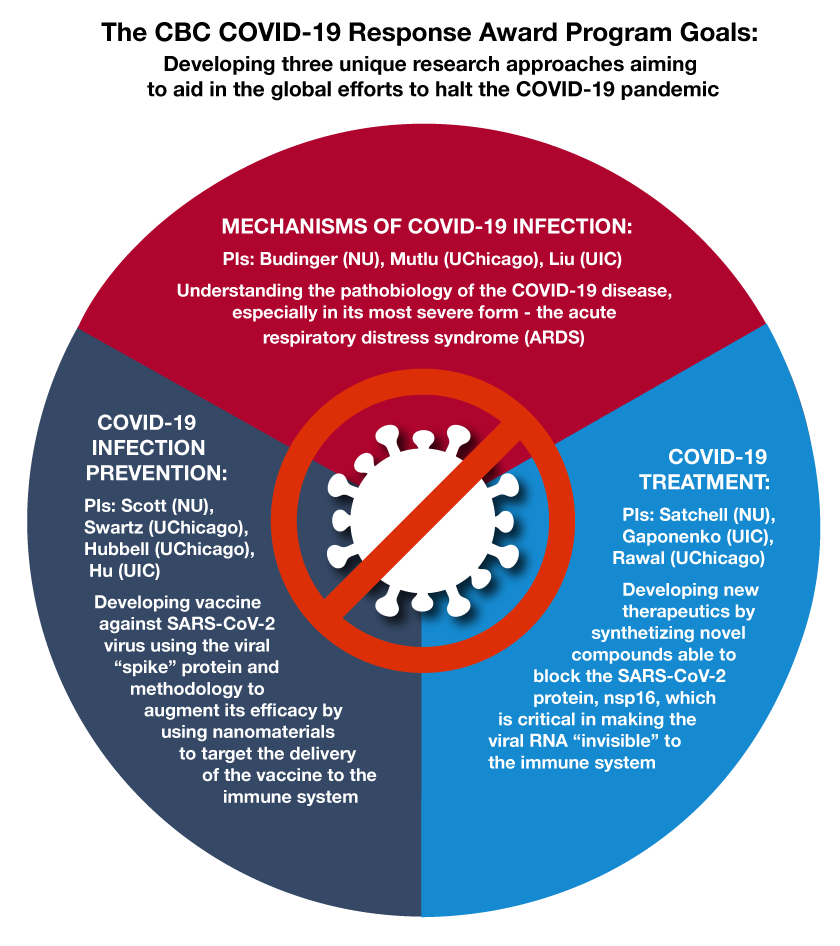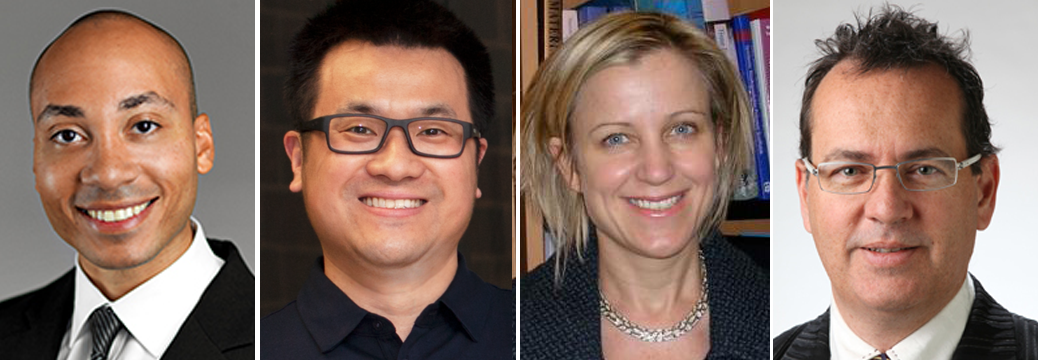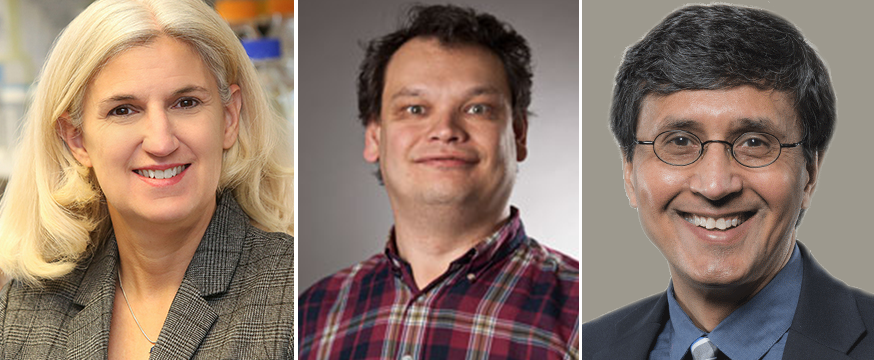September 18, 2020 | Jola Glotzer
Chicago Biological Consortium Awards $1.5 Million for COVID-19 Research
Three multi-institutional teams of investigators from NU, UIC and UChicago will each receive $500,000 to pursue cutting-edge research
The Chicago Biological Consortium (CBC) is pleased to announce the recipients of three CBC COVID-19 Response Awards totaling $1.5 million:
- PIs: G. R. Scott Budinger (NU), Jing Liu (UIC), and Gokhan Mutlu (UChicago) for the project:
Targeting Aberrant Immune Responses in Patients with Severe COVID-19 - PIs: Evan Scott (NU), Ying Samuel Hu (UIC), Melody Swartz (UChicago), and Jeffrey Hubbell (UChicago) for the project:
Novel Strategies for Enhancing Vaccine Efficacy Against SARS-CoV-2 - PIs: Karla Satchell (NU), Vadim Gaponenko (UIC), and Viresh Rawal (UChicago) for the project:
Covalent Inhibitors of the Nsp16 2′-O-Methyltransferase of SARS-CoV-2
“We are pleased to award what may be an unprecedented level of funding by a Chicago-based organization for COVID-19 research to the city’s multi-institutional teams of investigators,” said Rick Morimoto, CBC Interim Executive Director and Scientific Director for NU. “We were also thrilled to see the robust interest and response by all three institutions as driving collaboration is at the core of our mission.”
Hearing from the members of the CBC community about the urgent need for support of the biomedical research related to the COVID-19 disease, CBC leadership decided to challenge the investigators at the three CBC institutions by pledging $1.5 million in total to award three research projects that would – in the typical CBC style – be high-risk / high-reward and would address urgent COVID-19-related problems. The program was announced on June 10th and was coined the CBC COVID-19 Response. Each of the applying teams were required to include representation from each of the CBC universities – at least one principal investigator from NU, one from UChicago and one from UIC.
Seventeen teams submitted Letters of Intent, fourteen of which were invited to follow-on with the submission of complete applications. A panel of twenty-eight leading experts in COVID-19 disease, its causative virus SARS-CoV-2 or related research from top universities and research institutions across the United States was assembled by Nancy Tyrrell, CBC Associate Director for Translational Activities who is managing the program, to review the applications. Of the fourteen highly qualified submissions, three were deemed eligible for COVID-19 Response funding and CBC leadership was thrilled to award each of the three teams with $500,000.
“The review process was rigorous,” said Lucy A. Godley, CBC Scientific Director for UChicago, “we were elated by the willingness of leading researchers throughout the country to participate, most of whom were already immersed in their own work but made time to contribute. It speaks to the national and global efforts of scientists to unite and solve this challenge.”
The wide-ranging scope of the projects awarded by the CBC reflects the multifaceted needs in the COVID-19 research area and highlights the variety and excellence of research already being conducted in Chicago. The awards cover three unique and important areas: understanding of the pathobiology of the disease, developing new therapeutics, and accelerating the development of ultimate COVID-19-preventive measure – the COVID-19 vaccine (see graph).

The CBC COVID-19 Response Award Program Goals:
Developing three unique research approaches aiming to aid in the global efforts to halt the COVID-19 pandemic
Professors Budinger, Liu, and Mutlu have grounded their project around the questions addressing the pathobiology of the subset of the COVID-19-infected patients’ population – those who develop the most severe and frequently deadly acute respiratory distress syndrome (ARDS). By performing comparative genomic analysis of lung samples from COVID-19- positive and negative patients who suffered from severe pneumonia, the team has generated a compelling hypothesis as to why only some of the SARS-CoV-2-infected patients develop fibrosis, a rapidly progressive lung disease, resulting in the potentially fatal ARDS whereas the majority of the infected population goes unscathed. It appears that, in the severely ill COVID-19 patients’ lungs, the delicate balance between the damaging and healing processes shifts towards a progressively damaging, unable to heal anymore, state.
The goal of this CBC-awarded project is to test the hypothesis behind the selective lung fibrosis occurring in the most severe COVID-19 patients and to further the studies on potential COVID-19 therapeutics that could interfere with the proposed model of COVID-19 lung damage / healing processes. If successful, the results of this project could provide better understanding of the innate lung defense mechanisms and thus help steer the diagnostic and therapeutic efforts to help the most gravely affected COVID-19 patients.
As there are currently only limited treatments for COVID-19, Professors Satchell, Gaponenko and Rawal’s research team aims to disable the SARS-CoV-2 virus itself before it can cause the wreckage within the infected human body. SARS-CoV-2 belongs to RNA-type viruses, thus, after it infects a cell, the virus hijacks the cell’s transcription and translation machinery to generate numerous copies of new viral particles ready to exit the infected cell and attack another healthy cell. The process includes the production, assembly and activity of multiple “virus building blocks” within the infected cell. Satchell, Gaponenko and Rawal propose to “go after” one such “building block” – a viral protein called nsp16, which is an enzyme essential for the protection of the virus’s newly synthesized RNA, so it becomes unrecognizable by the host’s immune system.
The Satchell, Gaponenko and Rawal team is in a unique position to “go after” SARS-CoV-2 nsp16 as they have already determined its crystal structure in a complex with its binding partners. The goal of the project is to synthesize and characterize novel compounds able to interfere with the nsp16 function. Such compounds could be further developed as COVID-19 therapeutics.
The third team that received the CBC COVID-19 Response Award will concentrate on the ultimate goal to halt the pandemic – the development of an anti-SARS-CoV-2 vaccine. Professors Scott, Hu, Swartz, and Hubbell plan to use the SARS-CoV-2 virus’s so-called “spike” protein as the antigen to stimulate the production of anti-SARS-CoV-2 neutralizing antibodies. Located on the virus surface, the spike protein is key to the virus’s ability to bind to receptors on the cell membrane which are abundant on the surface of the inner cellular layer of the human airways – the epithelium. Hence, the lungs are one of the primary targets of the SARS-CoV-2 virus.
The idea that the team will pursue is not only to generate the vaccine-induced “spike” neutralizing antibodies, but also to use nanomaterials as “facilitators” of the vaccine’s targeted delivery to selected parts of the immune system. This could speed up both the antibody and memory T-cells production, preparing the immune system to execute a rapid and efficient response if a person becomes exposed to the live virus.
The CBC is supported by the Searle Funds at The Chicago Community Trust. “We are grateful for the support received for over fourteen years,” said Luisa DiPietro, CBC Scientific Director for UIC. “The commitment of the Searle Family to support biomedical research in Chicago has enabled the CBC to develop exciting and impactful initiatives such as the COVID-19 Response, which will ultimately benefit Chicagoans and society at large.”
The CBC is proud to have been able to offer and execute the COVID-19 Response Award program in a record time of three months. A true team effort and a tribute to the organization’s years of dedication to supporting excellence in research and fostering the collaborative spirit among the Chicago-based scientists. Kudos to all applicants and the awarded teams!
See more:
▸ COVID-19 Response Award RFA
▸ Funded COVID-19 Response Awards



